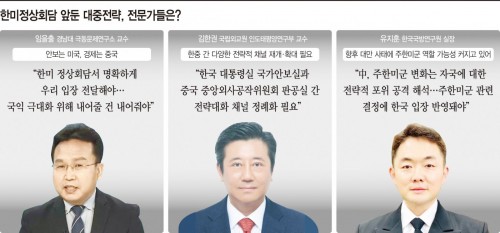 |
As the Korea-US summit expected later this month approaches, “alliance modernization” has emerged as the central issue, raising concerns over its implications for Seoul’s ties with Beijing. The concept includes expanding the operational scope of US Forces Korea (USFK) and clarifying Seoul’s stance on the Taiwan Strait, aligning with Washington’s China-containment strategy. Experts warn that President Donald Trump is likely to press Seoul to choose between Washington and Beijing, putting South Korea’s foreign policy balance to the test.
Alliance modernization calls for extending USFK’s mission beyond deterrence against North Korea to include potential regional contingencies in the Indo-Pacific. This could increase pressure on South Korea’s largest trading partner, China, prompting debate among policymakers and experts over how to maintain economic ties with Beijing while strengthening security ties with Washington.
Lim Eul-chul, professor at Kyungnam University’s Institute for Far Eastern Studies, stressed the importance of avoiding antagonistic relations with China. “We cannot afford to sever diplomatic or economic ties with China for the sake of our national interest,” he said. “While security cooperation with the US is essential, we must safeguard trade and supply chains reliant on China. Seoul should make its position clear at the summit.”
Kim Han-kwon of the Korea National Diplomatic Academy recommended bolstering multilateral diplomacy to mitigate tensions arising from US-China rivalry. “Through multilateral channels, we can reinforce shared values and national interests while managing sensitive bilateral issues with China under ‘limited damage’ frameworks,” he explained, adding that Korea should separate “values” from “sovereignty” in its China diplomacy.
He also called for reviving strategic dialogue channels, such as between Korea’s National Security Office and China’s Central Foreign Affairs Commission, to better manage disputes and prevent miscalculations.
On Taiwan, Kim argued that Seoul should uphold its longstanding “One China” policy while treating the Taiwan Strait as a sea lane of communication (SLOC) issue critical to Korea’s trade-dependent economy. “We must emphasize our reliance on stable maritime routes and support peace and stability under international law,” he said.
Yu Ji-hoon of the Korea Institute for Defense Analyses cautioned that China views potential USFK involvement in a Taiwan crisis as direct strategic encirclement. “This perception could lead Beijing to exert military, economic, or diplomatic pressure on Seoul. Any changes in USFK’s posture must fully incorporate Korea’s stance to mitigate such risks,” he warned.
Experts agree that Seoul faces a delicate balancing act: affirming its security alliance with Washington while sustaining pragmatic ties with Beijing, a challenge that will be on full display at the upcoming summit.
Most Read
-
1
-
2
-
3
-
4
-
5
-
6
-
7





















